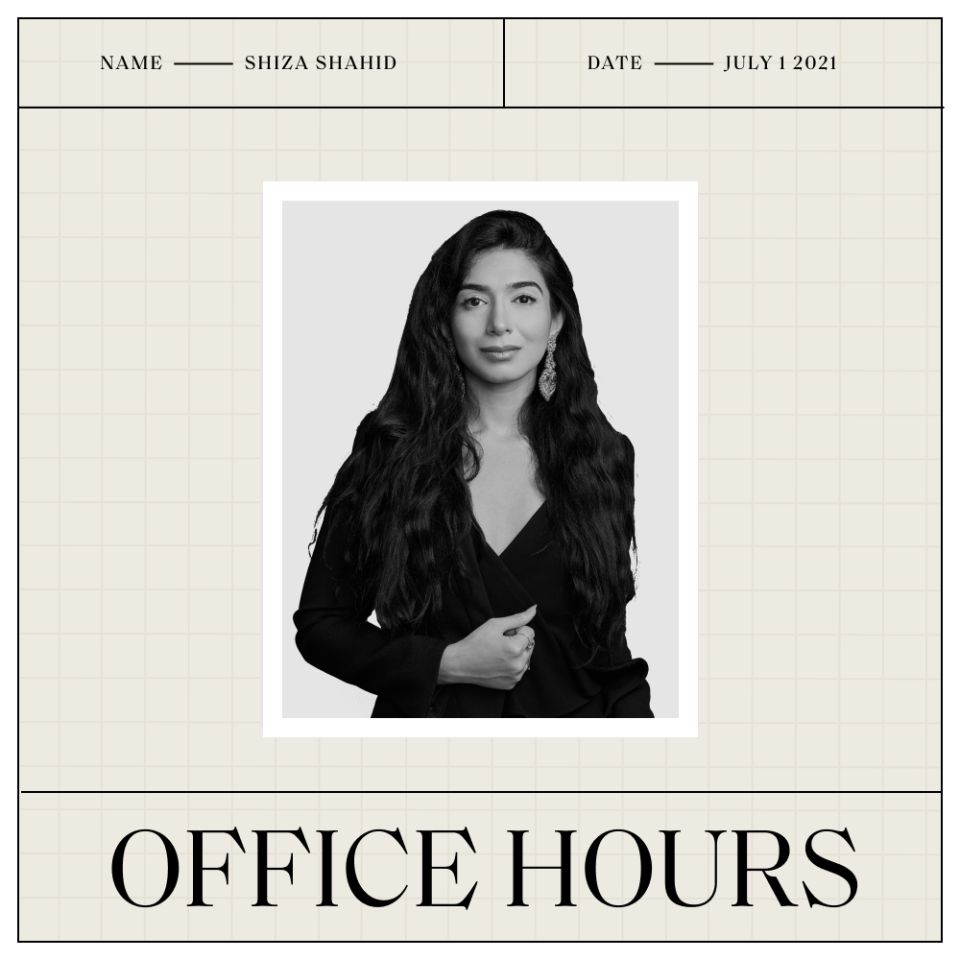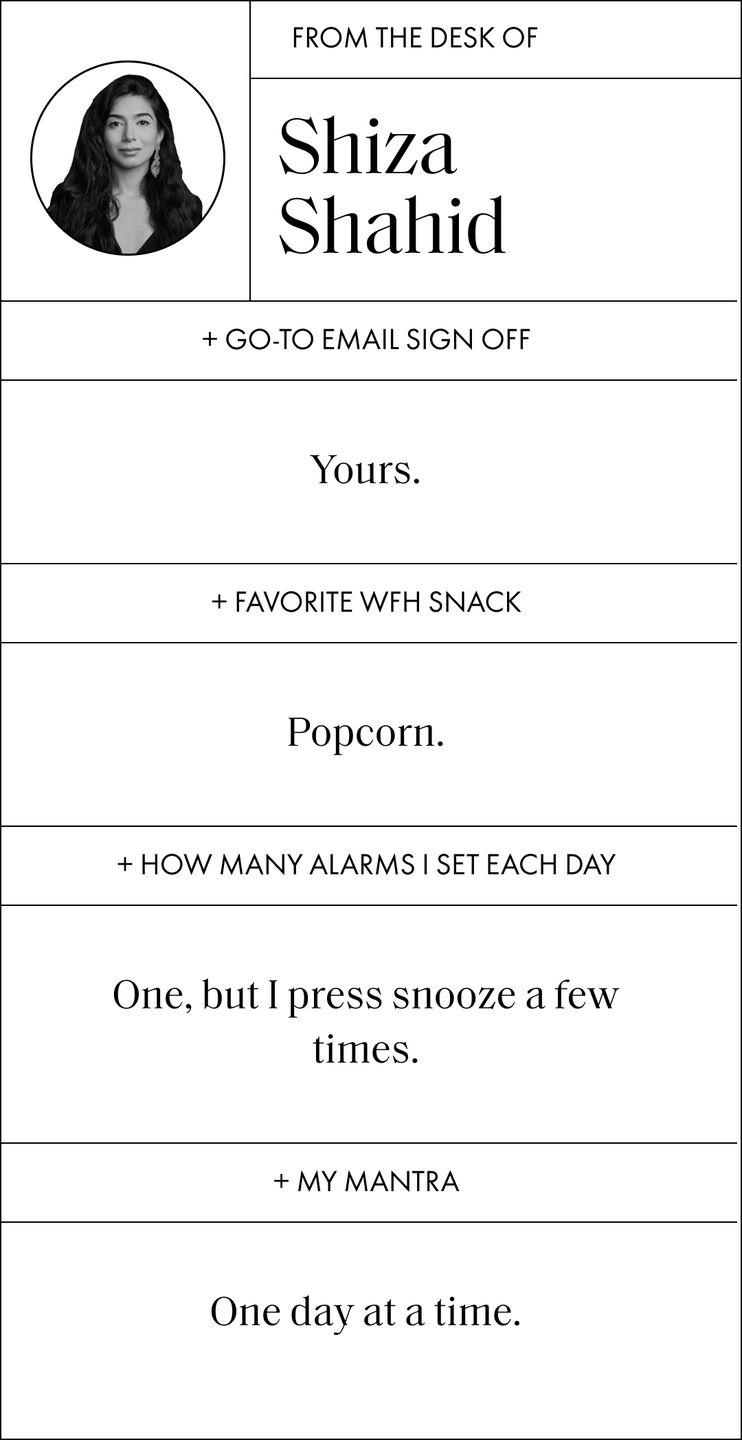How Shiza Shahid Went From Co-Founder of the Malala Fund to Building an Insta-Approved Cookware Brand

“Hearst Magazines and Verizon Media may earn commission or revenue on some items through the links below.”

In ELLE’s monthly series, Office Hours, we ask people in powerful positions to take us through their first jobs, worst jobs, and everything in between. This month, we spoke with Shiza Shahid, the co-founder and co-CEO of Our Place, the cookware brand behind the Instagram-famous Always Pan. Shahid, who was born and raised in Pakistan, has long been both an entrepreneur and an activist. In 2013, she became the co-founder of the Malala Fund, a nonprofit formed to advocate for girls’ education after its namesake and Shahid’s close friend, Malala Yousafzai, was shot by the Taliban on her way home from school. Now, Shahid says she’s focused on building a business that’s both successful and has a impact on the world. “I wanted to prove that those two could co-exist,” she tells ELLE. “And in fact, that that was the promise of the future.” Below, the avid home cook shares what inspired her latest venture and why conventional career paths are sometimes overrated.
My first job
I volunteered with a nonprofit and would carry medical supplies into a women’s prison in Pakistan. There were no female doctors for the prison, and Pakistan’s a very conservative country, so a lot of women wouldn’t come forward with medical issues as a result. This nonprofit would go in a couple of times a month with female doctors and listen to the women’s complaints and provide basic medical support. I must have been 12 years old. It was the first time I realized as a young person that I could actually make a difference, and that felt like my path in life. I learned a deep amount of humility, openness, and a desire to listen and understand.

Why you don’t need a traditional career path
I never thought about a career; I just wanted to make the world better. It’s been a process of showing up for issues I believe need to be fixed and that has turned into career opportunities, but I never really considered it in that way. I was fortunate to get a scholarship to Stanford, but I’d never heard of Stanford before I applied. When I got my job at McKinsey, I didn’t know what McKinsey was. A lot of my classmates had been preparing for these thing their entire lives and had a plan and internships, and I hadn’t done any of that. For a while, I felt inadequate and inferior. Now I look back at how unconventional my experiences have been, and it's made all the difference. We’ve been told if we keep our heads down and dot our i’s and cross our t’s, then we’ll end up secure and in the right place. And as I look around me, industries are uncertain, businesses shut down, the world is changing, we have no idea what the economy will look like in a year. That ability to reinvent yourself and be resilient and entrepreneurial is so much more important than a certain career path.
How I know it’s time to make a change
I was working at McKinsey after Malala was shot. I was with her in the hospital, and then I went back to my job after having been allowed, very generously, to take a lot of time off. I remember sitting at my laptop, and I kept switching from the spreadsheet I was supposed to be working on to a journalist I was writing to in order to get Malala’s story out into the world in a way that would inspire change. I remember thinking, what am I doing? I have a five-year plan. I’m on a path, and the path is certain and it’s real, and I’m going to get to go to business school and earn my stripes. But my heart wasn’t in it. That moment of misalignment is something I still remember, and it’s something I watch out for. If for an extended period of time, your heart is telling you, this is not what I’m meant to be doing in the world, how do you then start to solve for that? For me, it was quitting my job, moving to New York with a suitcase, and starting the Malala Fund, but sometimes it’s smaller pivots.

What I learned from the Malala Fund
Throughout the world, 130 million girls are out of school. We’ve known that for a long time. We know that girls suffer unspeakable violence every day. But Malala’s courage and her authenticity struck a chord. It made it personal. Across the board, girls’ education nonprofits will tell you that when Malala shared her story, they saw people finally understand the issue. I learned the power of a story to shift culture and the power of representation. Now, a big part of what I do at Our Place is share stories that celebrate all our traditions because most of us have not seen our cultures, our dinner tables represented in the mainstream. There’s a real sense of erasure when that happens, so what does it mean to recenter the culinary traditions of Black and brown communities like my own?
The worst career advice
“Follow your passion” is a bad one. It’s very burdensome. Do I only have one passion? How do I know something’s my passion? I like this, and I also like this, so which one’s my passion? Instead I try to ask myself, what is the most impactful thing I could be doing in this moment? At 22, the most impactful thing I could do was quit my job and build the Malala Fund. Several years later, the most impactful thing I could do was build Our Place as a business that’s working to create a seat at the table for everyone. Does that mean my passion is girls’ education or belonging and coming together? So I push back on “follow your passion.”

Why rest is so important
It sounds simple, but I want to put a plug in there for doing nothing. Sometimes I’ll make myself a nice haldi doodh, what you call here a turmeric latte, and just snuggle up with a book and go to bed a bit early. Sometimes we’re doing so much, and we’re doing things to feel like we’re not doing so much, especially in this new self-care economy. But I’m a big fan of doing nothing and just letting your brain recharge.
How I approach being part of the food industry
Home cooking is this place where who we are and what matters to us is centered and grounded and preserved. Our Place felt like a way to have a larger conversation about belonging, about immigration, about what does it mean for a place to be truly ours? I’m an immigrant, my partner is an immigrant, and we’re a team of primarily women and people of color. For us, the work is personal, and food is so much more than food. Food is identity, it’s culture, it’s politics, it’s innovation, it’s science, it’s heritage. Every story we tell is from that perspective. We’re not here to celebrate the culinary arts. We’re not here to turn you into the next Martha Stewart. We don’t care what you make. Make something with your hands. Acknowledge where the ingredients come from. Add in a spice that honors your ancestry, and share it with someone you love. That’s what we care about.
This interview has been edited and condensed for clarity.
You Might Also Like

